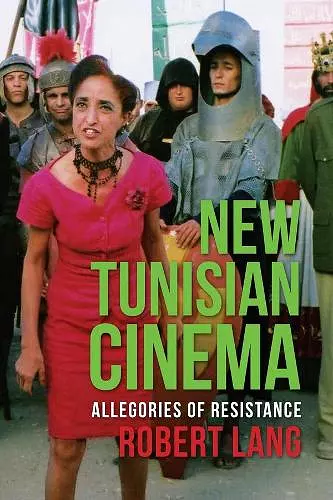New Tunisian Cinema
Allegories of Resistance
Format:Paperback
Publisher:Columbia University Press
Published:2nd May '14
Currently unavailable, and unfortunately no date known when it will be back

Lang's impressive study is a valuable and timely achievement. Through subtle and rich close readings of eight films released between 1986 and 2006, he examines how contemporary Tunisian filmmakers resisted authoritarianism in both the public and private spheres of their society and successfully forged a national cinema that sought to keep in sight the secular and modern vision of their country's founding intellectuals. -- Hakim Abderrezak, University of Minnesota Well written and well researched, this book draws on a variety of fields to offer clear readings of eight key films. The decoding of these films as allegories of political resistance is well argued and draws on an immense wealth of knowledge both theoretical and practical. -- Florence Martin, author of Screens and Veils: Maghrebi Women's Cinema
Tunisian cinema is often described as the most daring of all Arab cinemas. For many, Tunisia appeared to be a model of equipoise between "East" and "West," and yet, during Zine El Abidine Ben Ali's presidency, from 1987 to 2011, the country became the most repressive state in the Maghreb. Against considerable odds, a generation of filmmakers emerged in the mid-1980s to make films that are allegories of resistance to the increasingly illiberal trends that were marking their society. In New Tunisian Cinema, Robert Lang focuses on eight films by some of the nation's best-known directors, including Man of Ashes (1986), Bezness (1992) and Making Of (2006) by Nouri Bouzid, Halfaouine (1990) by Ferid Boughedir, The Silences of the Palace (1994) by Moufida Tlatli, Essaida (1997) by Mohamed Zran, Bedwin Hacker (2002) by Nadia El Fani, and The TV Is Coming (2006) by Moncef Dhouib. He explores the political economy and social, historical, and psychoanalytic dimensions of these works and the strategies filmmakers deployed to preserve cinema's ability to shape debates about national identity. These debates, Lang argues, not only helped initiate the 2011 uprising that ousted Ben Ali's regime but also did much to inform and articulate the aspirations of the Tunisian people in the new millennium.
Lang's impressive study is a valuable and timely achievement. Through subtle and rich close readings of eight films released between 1986 and 2006, he examines how contemporary Tunisian filmmakers resisted authoritarianism in both the public and private spheres of their society and successfully forged a national cinema that sought to keep in sight the secular and modern vision of their country's founding intellectuals. -- Hakim Abderrezak, University of Minnesota Well written and well researched, this book draws on a variety of fields to offer clear readings of eight key films. The decoding of these films as allegories of political resistance is well argued and draws on an immense wealth of knowledge both theoretical and practical. -- Florence Martin, author of Screens and Veils: Maghrebi Women's Cinema Robert Lang's New Tunisian Cinema is a timely and impressive examination of some of the most politically engaged films made during the Ben Ali era. This is the book I and many others have been waiting for-it fills a long overdue need to approach Tunisian cinema with both historical accuracy and theoretical rigor. It deserves to be widely read. -- Nouri Gana, editor of The Making of the Tunisian Revolution New Tunisian Cinema offers penetrating readings of eight Tunisian films made between 1986 and 2006 that elaborate a mode of cultural resistance. The films are anchored in their social and political context, and the analyses take up the 'national question' through the filmmakers' vision of their society's problems. This original work enriches our understanding of the political and cultural history of Tunisia and sheds new light on the implications of a 'Revolution' that holds up a mirror to us. -- Kmar Bendana, University of La Manouba, Tunisia Carefully researched and documented, and backed by Lang's strong theoretical knowledge, this original contribution is an excellent addition to the "Columbia University Film and Culture Series". Choice Lang's study is erudite, well written, and compelling, and offers students of Arab cinemas a welcome set of inquiries to inspire further studies of the works and themes he addresses. -- Kamran Rastegar International Journal of Middle East Studies As the first monograph published in the US on Tunisian cinema, Lang's book fills a major gap in scholarship... This excellent study is accessible to students and enriching for scholars interested in North African studies. It will be sure to stimulate further scholarship on the rich production of Tunisian cinema. -- Mohammed Hirchi Bulletin of the School of Oriental and African Studies An excellent introduction to the themes and filmmakers that make Tunisian cinema stand out. -- Eoin Bell-Games Film Matters
ISBN: 9780231165075
Dimensions: unknown
Weight: unknown
448 pages